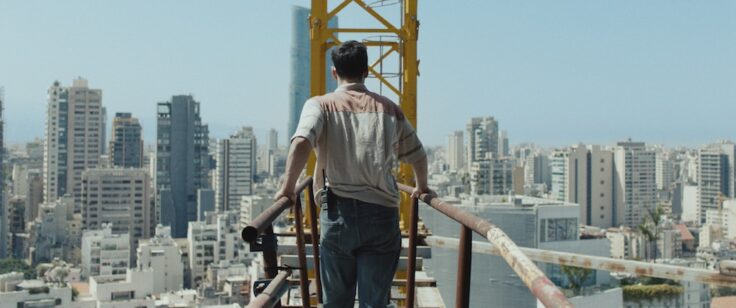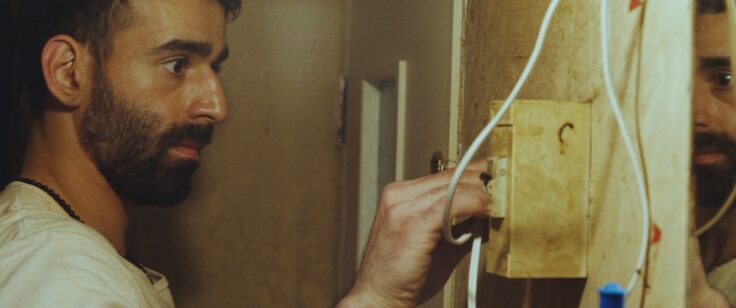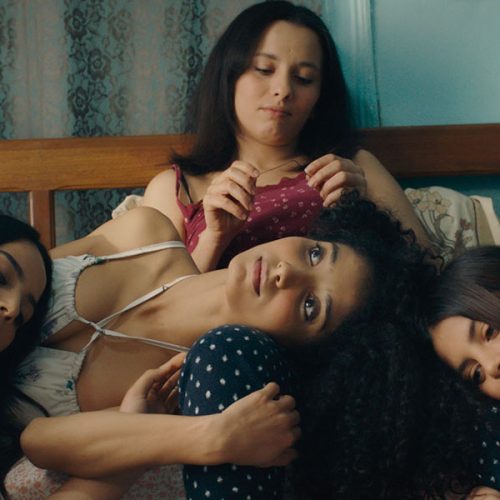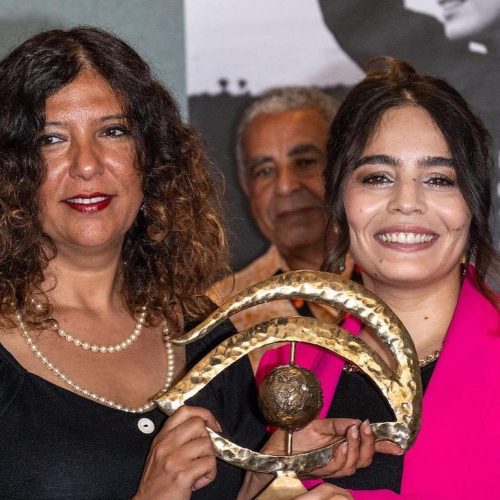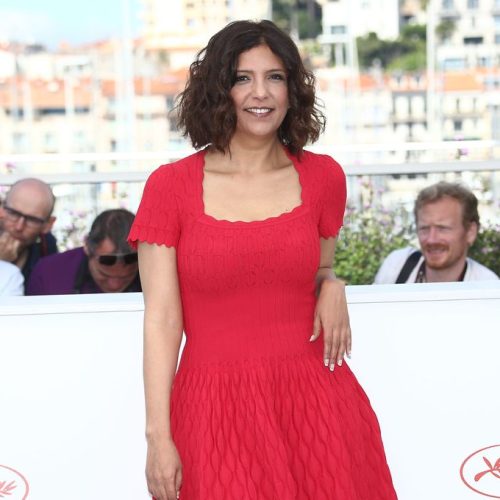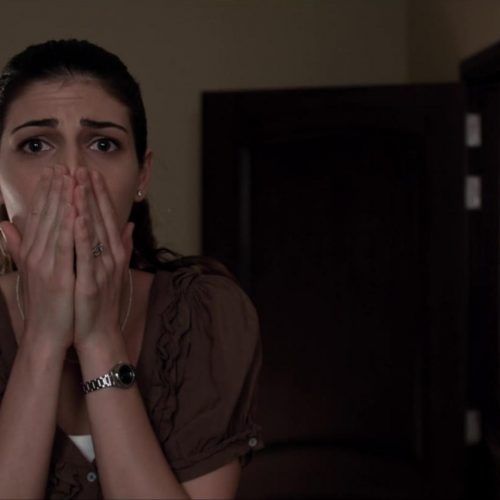Mark our words: Dania Bdeir is a superstar in the making. The Lebanese film director is shaking things up in the creative scene in the Middle East after her debut short Warsha was recently shortlisted in the “Live Action Short Film” category alongside 14 other films vying for an Oscar at the upcoming 95th Academy Awards on March 12, 2023. It is the only Arabic-language film to be selected in the category, which is “a dream,” in the words of the film director.
“I always knew I wanted to be in the industry since I was maybe four years old. I wanted to be an actress. So since I was a kid, I would grab a shampoo bottle or anything long-shaped and then practice my Oscar speeches. Then when I was 16 and I got my first camera, my speeches just turned from being like, ‘thank you for this best actor award to thank you for this best film or best director award,” she recalled.
There’s two ways for a film to be eligible for the Oscars. Either it is recognized in one of the Oscar-qualifying film festivals, or the other option is a film director or producer can pay to screen their works in a Los Angeles cinema for seven days. Then, once a film is eligible, it can be submitted online for board members of the Academy of Motion Picture Arts and Sciences to watch and give a score, before announcing the shortlist and subsequent final five nominees a month later.
Warsha won awards at three Oscar-qualifying festivals, including the Sundance Film Festival, where it made its debut last January. It was also screened in Los Angeles for a week, meaning that its Oscars run was practically inevitable.
Bdeir is up against some tough competition in her category, including four-time Academy Award winner Alfonso Cuarón, who produced Disney’s Le Pupille. However, the UAE-based filmmaker is no stranger to accolades – Warsha has already won numerous awards at film festivals around the world.
“I think we have a good chance, but even if we don’t, the shortlist is a huge,” said the NYU graduate. “Out of 200 (films) around the world, we’re part of the top 15 and we’re already starting to get associated with the Academy, which is very renowned.”
For Bdeir, the shortlist was kind of a full circle moment. “Hollywood has been the institution that has been giving the entire world films that have been translated to a million languages that have shaped a lot of international cultures. I’m happy that these days we are starting to look at international productions. That’s great because my films are Lebanese, so I’m happy that the world has shifted to a place where we are willing to watch non-English language films and to have titles that go beyond the borders of Hollywood,” she continued.
“I started watching all of these movies from Hollywood, watching the Oscars, dreaming about the Oscars. And then now we’re in a stage where we can tell our own stories and bring them to the Oscars. I get goosebumps talking about it.”
Like most great ideas, the inspiration for Warsha came to Bdeir when she wasn’t even looking. The filmmaker was in Beirut in the summer of 2017 and she saw a man standing on top of a crane cabin about 120 meters in the air. At first, she recalls that she felt scared that he was going to jump, but when he knelt down she realized he was praying. “That image stuck in my head of a man standing on top of a beast of a crane, praying in his kind of bubble of privacy and spirituality,” shared the director.
The rest of the story was inspired by a live concert performed by Lebanese artist Mohammad Khansa, who Bdeir tapped to portray the main protagonist in Warsha.
“He was blending gender, moving between belly dancing and singing and kind of just going beyond any ideas of traditional masculinity and just presenting this beautiful piece of music and art. After I met him and started talking to him, he inspired the rest of the story,” explained the filmmaker.
As Bdeir tells it, her short is about a Syrian migrant worker in Beirut who volunteers to take on the tallest of dangerous cranes in Lebanon, just to finally find the privacy and the space to be himself. Part of the reason why she became interested in telling the film is because she felt like it’s the kind of character that the industry doesn’t usually shed light on. She could have taken the typical orientalist route and told a story about the plight of the migrant worker or the refugee, but she wanted to go beyond that and offer a more nuanced perspective.
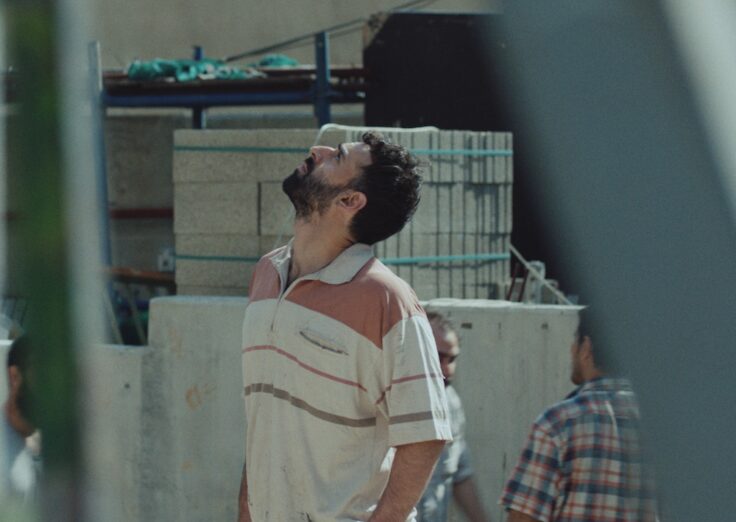
“What is this person’s deepest desire and dream and who is he as a person? I feel like that’s what says who we are as people, not just what job you are, what passport you have, and what economic situation you’re in, which allows us to stay separate from each other. What or who would you be if you didn’t happen to be born under these circumstances?” she continued.
Warsha, even if we’re not all crane operators, is the kind of film that resonates with a wide spectrum of people. It’s an emotional journey of someone who wants to escape from societal pressures and difficult situations, even if it’s scary, just to have the space and freedom to be themselves. It’s a film ultimately about liberation.
“I think the reason why Saudi Arabia and the rest of the region, I believe, will feel something towards it is because it hits home on a much deeper level, this fight and journey towards freedom and liberty,” shared Bdeir.
Naturally, there are a lot of technical and logistical aspects to consider when you’re shooting a film about a crane operator that is mostly set over 100 meters in the sky. At first, Bdeir wanted to film everything in real time but immediately changed her mind when she, alongside Khansa and a camera operator, went to shoot a teaser trailer to fundraise for the project.

“We got to the stage where we had to climb the ladder, and the camera operator looked up and he froze and he handed me the camera and says, ‘listen, I have kids, good luck. I hope you get what you need, but there’s no way I’m going up there,’” recalls Bdeir.
“So I had to put the camera in my backpack and climb the ladder myself. I’m someone who’s not afraid of heights, usually. But in that moment, climbing the ladder, I got vertigo. I started seeing everything blurry and I realized how vulnerable it is to be on this ladder, which also helps when you’re writing for the film in the putting yourself in the shoes of the character. I had to climb up feeling the emotions, the sounds disappearing, feeling how the wind gets stronger the higher you get. Even if it’s metal, it starts swaying with the wind. It starts creaking, but you can’t look down and you have to focus on what you’re doing,” she added.
That’s when Bdeir decided that she needed to figure out another solution. So, she called her producer and they met with a post-production house in France that has an LED video wall, which uses a dynamic background to produce stunning and realistic visuals at the site without any green screens. This cutting-edge technology was used to shoot The Mandalorian and by Netflix to make 1899, among other projects. “I am someone who was very afraid and not super comfortable with the idea of shooting in a studio because I’m used to being on location, getting inspired from a space, from the smells, from the light. I still feel that way, but there are some spaces that you just can’t access,” she explained.
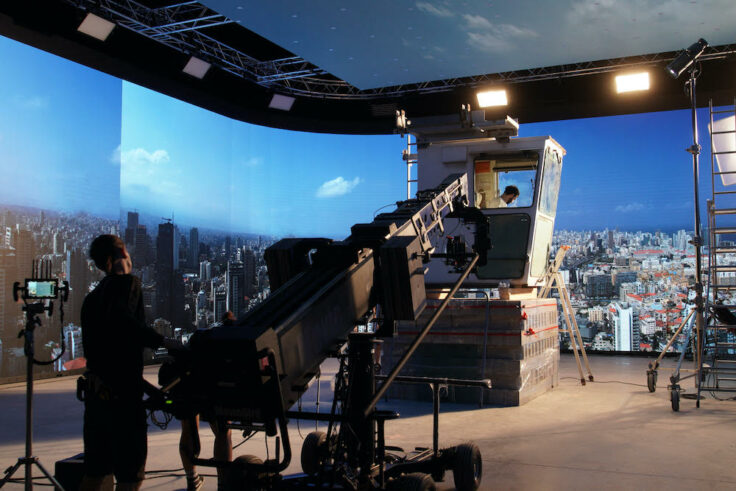
Bdeir and her team flew a drone in Lebanon from the height of a crane and took 360-degree images at different times of the day. They sent the footage to France, where it was put into the LED screen. They then brought in a crane cabin and shot the 15-minute film over two days. “Even though we were in the South of France, it was like being in Lebanon,” shared the filmmaker. “Instead of looking at a green screen and imagining the sea or the mosque downtown, Khansa could actually see the view from up top and react emotionally to it,” she added.
Sundance was the first film festival that the director submitted Warsha to. Extremely competitive — filmmakers have a 0.06% chance of being selected at the annual Utah-based cinematic celebration— Bdeir wasn’t expecting that Warsha would even be picked, let alone win a prize. “That was the first feeling of recognition, first feeling of being seen, and feeling like your story is worthy,” she mused. “From a sea of films, they chose a simple film from Lebanon about one day in the life of a crane operator. That was the happiest moment of my life, I think.”
Bdeir’s short film went on to be screened in more than 60 countries, where it has won more than 80 awards. Indeed, the creative has been making waves in the film industry for her unique and powerful storytelling— she’s currently working on her first feature film about Lebanon’s underground pigeon wars— and the recent stamp-of-approval from the prestigious Academy is a testament to her unparalleled talent.





